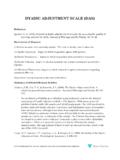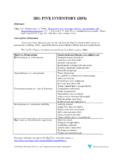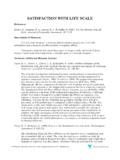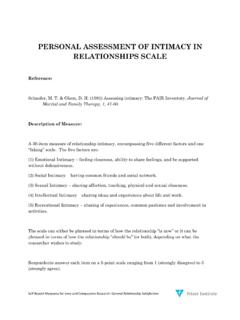Transcription of UCLA LONELINESS SCALE VERSION 3 - Fetzer Institute
1 Self Report Measures for Love and Compassion Research: LONELINESS and Interpersonal Problems UCLA LONELINESS SCALE VERSION 3 Reference: russell , D. (1996). UCLA LONELINESS SCALE ( VERSION 3): Reliability, validity, and factor structure. Journal of Personality Assessment, 66, 20-40. Description of Measure: A 20-item SCALE designed to measure one s subjective feelings of LONELINESS as well as feelings of social isolation. Participants rate each item on a SCALE from 1 (Never) to 4 (Often). This measure is a revised VERSION of both the original UCLA LONELINESS SCALE and the Revised UCLA LONELINESS SCALE . The first revision was done to make 10 of the 20 original items reverse scored.
2 The second revision was done to simplify the SCALE so less educated populations could comprehend it (see other UCLA LONELINESS SCALE pages on this website). Abstracts of Selected Related Articles: russell , D , Peplau, L. & Ferguson, M. L. (1978). Developing a measure of LONELINESS . Journal of Personality Assessment, 42, 290-294. Research on LONELINESS has been hindered by the lack of a simple and reliable assessment technique. The development of the UCLA LONELINESS SCALE , a short, 20-item general measure of LONELINESS is reported. The measure has high internal consistency (coefficient alpha = .96) and a test-retest correlation over a two-month period of .73. Concurrent and preliminary construct validity are indicated by correlations with self-reports of current LONELINESS and related emotional states, and by volunteering for a LONELINESS clinic.
3 russell , D , Peplau, L. , & Cutrona, C. E. (1980). The Revised UCLA LONELINESS SCALE : Concurrent and discriminate validity evidence. Journal of Personality and Social Psychology, 39, 472-480. The development of an adequate assessment instrument is a necessary prerequisite for social psychological research on LONELINESS . Two studies provide methodological refinement in the measurement of LONELINESS . Study 1 presents a revised VERSION of the self-report UCLA (University of California, Los Angeles) LONELINESS SCALE , designed to counter the possible effects of response bias in the original SCALE , and reports concurrent validity evidence for the revised measure. Study 2 demonstrates that although LONELINESS is correlated with measures of negative affect, social risk taking, and affiliative tendencies, it is nonetheless a distinct psychological experience.
4 McKenna, K. Y. A., Green, A. S., & Gleason, M. E. J. (2002). Relationship formation on the internet: What's the big attraction? Journal of Social Issues, 58, 9 31 Self Report Measures for Love and Compassion Research: LONELINESS and Interpersonal Problems We hypothesized that people who can better disclose their "true" or inner self to others on the Internet than in face-to-face settings will be more likely to form close relationships on-line and will tend to bring those virtual relationships into their "real" lives. Study 1, a survey of randomly selected Internet newsgroup posters, showed that those who better express their true self over the Internet were more likely than others to have formed close on-line relationships and moved these friendships to a face-to-face basis.
5 Study 2 revealed that the majority of these close Internet relationships were still intact 2 years later. Finally, a laboratory experiment found that undergraduates liked each other more following an Internet compared to a face-to-face initial meeting. SCALE : INSTRUCTIONS: Indicate how often each of the statements below is descriptive of you. Statement Never Rarely Sometimes Often *1. How often do you feel that you are "in tune" with the people around you? 1 2 3 4 2. How often do you feel that you lack companionship? 1 2 3 4 3. How often do you feel that there is no one you can turn to? 1 2 3 4 4 How often do you feel alone? 1 2 3 4 *5. How often do you feel part of a group of friends?
6 1 2 3 4 *6. How often do you feel that you have a lot in common with the people around you? 1 2 3 4 7. How often do you feel that you are no longer close to anyone? 1 2 3 4 8. How often do you feel that your interests and ideas are not shared by those around you? 1 2 3 4 *9. How often do you feel outgoing and friendly? 1 2 3 4 *10. How often do you feel close to people? 1 2 3 4 11. How often do you feel left out? 1 2 3 4 12. How often do you feel that your relationships with others are not meaningful? 1 2 3 4 13. How often do you feel that no one really knows you we11? 1 2 3 4 14. How often do you feel isolated from others? 1 2 3 4 *15. How often do you fee1 you can find companionship when you want it?
7 1 2 3 4 *16. How often do you feel that there are people who really understand you? 1 2 3 4 17, How often do you feel shy? 1 2 3 4 18. How often do you feel that people are around you but not with you? 1 2 3 4 *19. How often do you feel that there are people you can talk to? 1 2 3 4 *20. How often do you feel that there are people you can turn to? 1 2 3 4 Scoring: The items with an asterisk are reverse scored. Keep scoring on a continuous basis. This SCALE is provided only for Researchers.












